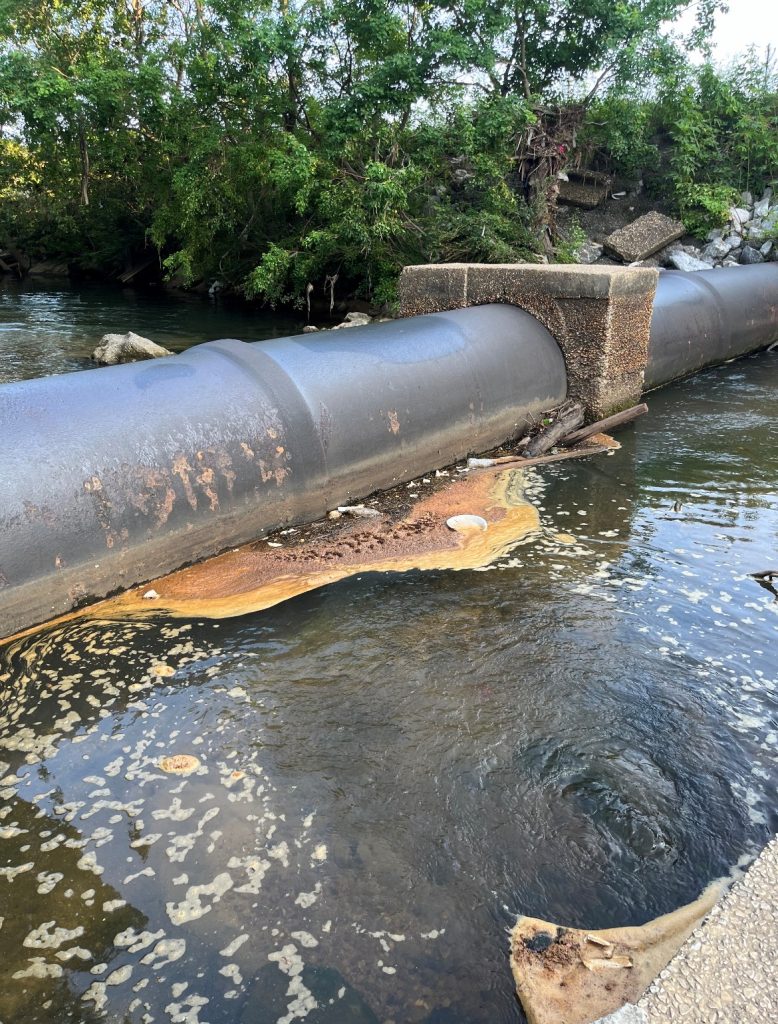Tuscaloosa Sewage Intervention
Tuscaloosa ignores chronic sewage spills, groups join state lawsuit
For immediate release: October 2, 2023
Contact:
Terah Boyd, SELC, 678-234-7990, [email protected]
Nelson Brooke, Black Warrior Riverkeeper, 205-458-0095, [email protected]
John Wathen, Friends of Hurricane Creek, 205-310-3739, [email protected]
TUSCALOOSA, Ala.— Black Warrior Riverkeeper and Friends of Hurricane Creek, represented by the Southern Environmental Law Center (SELC), petitioned the Court to join a lawsuit against the city of Tuscaloosa for chronic sewage spills, which violate the Clean Water Act and the Alabama Water Pollution Control Act.
For decades, the city of Tuscaloosa allowed its sewer system to fall into disrepair, including broken sewers, leaking manholes, and pump station failures. Because of these failures, rainwater enters and overwhelms the system, creating sewage overflows. nearly 42 million gallons of sewage have spilled into Tuscaloosa’s streets, backyards, and streams since 2018.
The city’s own reports show more than 350 illegal raw sewage overflows and more than 1000 wastewater discharge permit violations in the past five years. Approximately 2 million gallons of raw sewage spilled in Cottondale Creek, Hurricane Creek, and Little Hurricane Creek alone since 2018. Many spills occur along the main sewer line along the river, adjacent to the Riverwalk, putting those recreating along and in the river in harm’s way.
In mapping spill locations, SELC discovered a disproportionate amount of chronic sewage overflows in predominantly Black communities, raising questions about the city’s priorities when it comes to patching its failing sewage system (you can find SELC’s map here). More than half of the city’s SSOs occur during dry weather, indicating that the city is failing to properly operate and maintain its sewer system.
“Tuscaloosa’s sewage spills have been happening for over two decades while we have been encouraging Tuscaloosa to clean up its act and properly notify communities,” said Nelson Brooke, Black Warrior Riverkeeper. “It is unacceptable that the city has allowed raw sewage and industrial wastewater to pollute local streams and the river for years, which is disproportionately impacting Black and low-income communities in Tuscaloosa.”
Black Warrior Riverkeeper water testing revealed that the city is discharging undisclosed pollutants, including chloride, aluminum, barium, manganese, iron, and sodium. During visits to sewer system sites, Hurricane Creekkeeper observed sewage stations in disrepair, including metal corrosion from apparent hydrogen sulfide leaks.
“Families bringing their children to play and swim in Hurricane Creek Park had no clue they were exposing them to raw sewage,” said John Wathen, Hurricane Creekkeeper. “The city’s ineptitude threatens the health and safety of Tuscaloosa communities who deserve peace of mind and trust that their water is clean.”
In a July letter SELC notified Tuscaloosa leaders as well as the Alabama Department of Environmental Management (ADEM) of these numerous violations, and that the groups intended to sue the city if sewage issues were not addressed. The groups requested a meeting with city officials to resolve chronic sewage spills. Tuscaloosa officials ignored multiple attempts to schedule meetings.
“Tuscaloosa is clearly violating the law, and putting the health of the citizens of Tuscaloosa at risk,” said Sarah Stokes, Senior Attorney with SELC. “This isn’t the first time that Tuscaloosa has been sued for its sewage overflows. Our clients want to join in the state case and to convince Tuscaloosa to provide meaningful and permanent solutions this time.”
Sewage spills harm people and the environment. Direct contact with sewage contaminated water, which also contains industrial wastewater, can cause severe health risks, especially in children, pregnant women, older adults, and people with compromised immune systems. This type of water pollution can kill fish or make them dangerous for people to eat. The Environmental Protection Agency estimates up to 3.5 million people are sickened by sewage contaminated water each year.
To read the October 2, 2023 Motion to Intervene, click here.
For a high-resolution picture of polluted water in Cribbs Mill Creek where the city of Tuscaloosa discharges its wastewater, click here. Photo by SELC.
###
The Southern Environmental Law Center is one of the nation’s most powerful defenders of the environment, rooted in the South. With a long track record, SELC takes on the toughest environmental challenges in court, in government, and in our communities to protect our region’s air, water, climate, wildlife, lands, and people. Nonprofit and nonpartisan, the organization has a staff of 200, including more than 100 attorneys, and is headquartered in Charlottesville, Va., with offices in Asheville, Atlanta, Birmingham, Chapel Hill, Charleston, Nashville, Richmond, and Washington, D.C.
southernenvironment.org
Black Warrior Riverkeeper’s mission is to protect and restore the Black Warrior River and its tributaries. The nonprofit organization promotes clean water for the sake of public health, recreation, and wildlife habitat throughout the Black Warrior River watershed.
blackwarriorriver.org/
The Friends of Hurricane Creek’s mission is to promote the protection and rehabilitation of Hurricane Creek and its watershed. John Wathen, Hurricane Creekkeeper, leads the nonprofit organization’s environmental enforcement program.
facebook.com/groups/FriendsofHurricaneCreek/

Polluted water in Cribbs Mill Creek where the city of Tuscaloosa discharges its wastewater. Photo by SELC.












